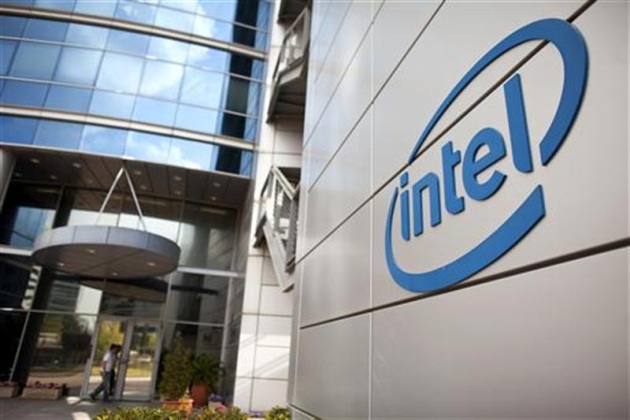- Home
- Laptops
- Laptops News
- Intel funds next gen chipmaking, buys into ASML for $4.1 billion
Intel funds next-gen chipmaking, buys into ASML for $4.1 billion

Intel hopes to speed the adoption of the next generation of chip manufacturing processes from ASML by as much as two years. That will require intensive capital investment, but delivers billions of future savings by cutting chip production costs, analysts said.
ASML, the world's largest supplier to chipmakers of machines that etch circuits onto silicon wafers, may want to spread the risk of developing cutting-edge chipmaking equipment, based on 450-millimeter wafer sizes and "extreme-ultraviolet" or EUV lithography.
Intel will acquire an initial 10 percent stake in its European supplier and tack on another 5 percent if it wins shareholder approval, for a total of about $3.1 billion. It also benefits by being able to move on to larger wafer sizes.
Apart from the savings that will bring, the chipmaker may also be moving to safeguard its current technology lead.
"By accelerating the introduction of 450mm fabs, Intel will increase barriers to entry a lot and make it harder for small players to keep going," said Pierre Ferragu, a senior analyst for Sanford C. Bernstein.
"By supporting EUV, Intel probably anticipates continued accelerated shrink plans beyond 15 nm..., and also a world in which cost efficiency matters more and more for them."
Intel and other chipmakers are grappling with slowing demand as consumers shift to mobile devices, and economic growth in Europe and even emerging markets is weakening. On Monday, Advanced Micro Devices warned its second-quarter revenue may slide 11 percent, blaming disappointing demand from China and Europe.
RBC Capital analyst Doug Freedman estimates Intel can save about $2 billion a year on 450mm processes, versus the current standard of 300mm. Larger silicon wafers lower production costs because more chips can be sliced off them.
"The transition from one wafer size to the next has historically delivered a 30 to 40 percent reduction in die cost," Chief Operating Officer Brian Krzanich said in a statement. "The faster we do this, the sooner we can gain the benefit of productivity improvements."
Under the agreement, the world's top chipmaker gains no exclusive rights to future ASML products. But Freedman said Intel, as the sector leader, stands to gain if the overall industry benefits.
"I was a little surprised that ASML did not offer exclusivity or preferential access," Freedman said. But "if in fact they're lowering the cost of technology in emerging markets, you're opening markets as well."
Intel remains at the vanguard of computer processors but is seeing rivals like Samsung Electronics come on strong in application microchips for smartphones and other mobile devices. Analysts say the U.S. company maintains a two-year lead over the competition but needs to spend heavily to safeguard that.
Market slowing
ASML competes with Japanese groups Canon and Nikon. Its clients include Intel and Samsung Electronics. Ferragu said Intel's decision to tie up with ASML might come as a blow to Nikon, which also researches and develops lithography processes.
A shift to cutting-edge EUV helps push the natural progression of semiconductor technology advancement known as "Moore's Law", which posits that the average number of transistors packed on a chip doubles every 18 months.
Intel will help finance $1 billion of research into 450mm and EUV chipmaking, both cutting-edge technologies expected to emerge in the decade's second half.
While many semiconductor companies outsource the fabrication of actual chips to third-party "foundries", Intel is among the last remaining chipmakers that build and operate their own network of multibillion dollar production facilities, or "fabs".
"If Intel is able to ramp 450mm production ahead of the world's fabs such as TSMC or Global Foundries et al, it may yet prove that real men have fabs," said John Jackson from CCS Insight. "There are signs that the global semiconductor fabrication sector is poised to realign."
Intel is the first major chipmaker to sign up for ASML's "customer investment" program, under which it hopes to enlist partners to fund expensive research into 450mm wafer technology.
Under their agreement, Intel will pay 1.7 billion euros for the initial 10 percent slice of ASML, and a preliminary 553 million euros for research.
The pact also involves advance orders of next-generation ASML chipmaking gear, strengthening the Dutch firm's assurance to move ahead in developing the technology.
Intel shares slid about 1 percent to $25.87 after hours, from a close of $26.17 on Nasdaq. ASML shot up 6.3 percent to $51.53 from a close of $48.46.
Copyright Thomson Reuters 2012
Catch the latest from the Consumer Electronics Show on Gadgets 360, at our CES 2026 hub.
Related Stories
- Samsung Galaxy Unpacked 2025
- ChatGPT
- Redmi Note 14 Pro+
- iPhone 16
- Apple Vision Pro
- Oneplus 12
- OnePlus Nord CE 3 Lite 5G
- iPhone 13
- Xiaomi 14 Pro
- Oppo Find N3
- Tecno Spark Go (2023)
- Realme V30
- Best Phones Under 25000
- Samsung Galaxy S24 Series
- Cryptocurrency
- iQoo 12
- Samsung Galaxy S24 Ultra
- Giottus
- Samsung Galaxy Z Flip 5
- Apple 'Scary Fast'
- Housefull 5
- GoPro Hero 12 Black Review
- Invincible Season 2
- JioGlass
- HD Ready TV
- Laptop Under 50000
- Smartwatch Under 10000
- Latest Mobile Phones
- Compare Phones
- OnePlus Turbo 6V
- OnePlus Turbo 6
- Itel Zeno 20 Max
- OPPO Reno 15 Pro Mini 5G
- Poco M8 Pro 5G
- Motorola Signature
- Vivo Y50e 5G
- Vivo Y50s 5G
- Lenovo Yoga Slim 7x (2025)
- Lenovo Yoga Slim 7a
- Realme Pad 3
- OPPO Pad Air 5
- Xiaomi Watch 5
- Huawei Watch 10th Anniversary Edition
- Acerpure Nitro Z Series 100-inch QLED TV
- Samsung 43 Inch LED Ultra HD (4K) Smart TV (UA43UE81AFULXL)
- Asus ROG Ally
- Nintendo Switch Lite
- Haier 1.6 Ton 5 Star Inverter Split AC (HSU19G-MZAID5BN-INV)
- Haier 1.6 Ton 5 Star Inverter Split AC (HSU19G-MZAIM5BN-INV)

















